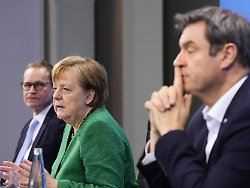Sunday April 11, 2021
“Deviated more clearly than NRW”
Merkel counts Bavaria because of the emergency brake
Chancellor Merkel expresses her displeasure with the failure of some federal states to keep their commitments regarding the emergency brake. Above all, the deviation in Bavaria is a thorn in her side. The “emergency brake” is now to be anchored in law for the federal states. However, according to the federal government’s plans, there is criticism.
Chancellor Angela Merkel has criticized Bavaria’s approach to the Corona crisis, according to participants in the meeting of the Union’s executive parliamentary group. The CDU politician emphasized at the meeting of the board of the CDU / CSU parliamentary group that North Rhine-Westphalia deviated only minimally from the federal-state resolutions, if at all. Others went further.
“Bavaria has now deviated even more significantly,” Merkel said, according to the participants. Markus Söder will defend this by saying that it is due to court judgments. Unfortunately, the public had the impression that NRW Prime Minister Armin Laschet had deviated more strongly. She herself criticized the states of Berlin and North Rhine-Westphalia in a talk show. Other countries would have adhered to the agreements less. “I was annoyed about the countries,” said Merkel.
The government wants to anchor nationwide uniform regulations against the third corona wave in the Infection Protection Act. However, there is clear criticism of the plans. While state politicians are warning of a state disempowerment, opposition factions consider the planned exit restrictions in particular to be problematic. As early as Tuesday, the cabinet wants to bring the legal requirements in motion.
Meanwhile, the infection situation is getting more and more out of control. The legal anchoring of the “emergency brake” would provide that in counties with more than 100 weekly new infections per 100,000 inhabitants, the restrictions would then have to be tightened again.
In the wording aid available to ntv, the draft proposes, among other things, exit restrictions from 9 p.m. to 5 a.m. There should be only a few exceptions, for example for medical emergencies or the way to work, but not for evening walks alone. A compulsory test is under discussion for schoolchildren. Schools should only close if the incidence is 200 or more on three consecutive days in a district.
Merkel again spoke out in favor of a consistent lockdown at the meeting of the Union faction leadership. The bridge of restrictions should be as short as possible, she said. The aim is to combine opening steps with testing.
Several parliamentary groups consider the federal government’s proposals to be highly problematic. “The issue of curfews in particular is such a deep encroachment on the freedom of movement of citizens that cannot simply be decided en passant,” warned the first parliamentary manager of the left-wing faction, Jan Korte, in a letter to the health and interior ministries . In addition, there are no mandatory regulations for large companies, while there are massive restrictions in the private sector.
Lindner with a letter to Merkel
The FDP criticized the exit restriction as disproportionate. “For example, there is no risk of infection from a vaccinated couple’s evening walk,” said party leader Christian Lindner. It is also wrong to focus solely on the incidence value of 100. “A fluctuating number that is even politically applied is not suitable as a trigger for massive restrictions on freedom,” he said. In a letter to the Chancellor, Lindner is also said to have emphasized that the draft was “not approvable by the Free Democrats in the current version”.
Lower Saxony’s Interior Minister Boris Pistorius warned that the federal government had no expertise in crisis management or crisis communication. “That is why it would not be a good idea to disempower the countries now in the middle of the crisis. That would be a big mistake,” he told the “world”. The corona rules should also be regionally adapted to the infection rate in the future. “A mere standardization completely hides the collateral damage that is always associated with all Corona regulations,” warned Pistorius.
The Prime Minister of Mecklenburg-Western Pomerania, Manuela Schwesig, on the other hand, supported the federal plans. “We are open to changes in the law, we have long felt that certain restrictions and also instruments belong in a federal law. For example, the exit restrictions,” said the SPD politician to the broadcasters RTL and ntv. At the same time, however, there must be more support, for example for the catering industry.
.
